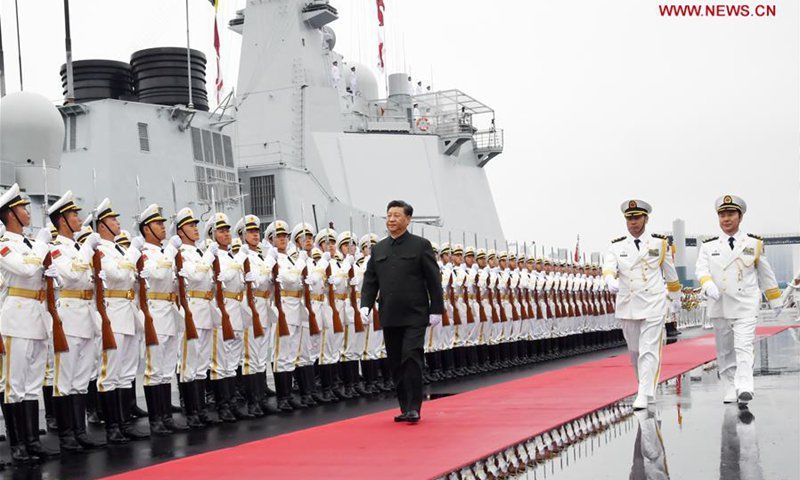Two NATO nations are likely to cause a big headache to the rest of the military alliance, which is seeking greater cooperation among its members to counter China. NATO has identified China as the most important challenge of this decade.
Why Chinese ‘Hunter-Killer’ Tanks Present Big Challenge To QUAD Allies India & The US
While the US-Turkey tussle could be a major stumbling block before NATO, there is another vital factor that seems to have been glossed over by the western military alliance.
China was a major focus of the NATO Summit held in Brussels last month. The concluding statement of the summit noted, “China’s stated ambitions and assertive behavior present systemic challenges to the rules-based international order and to areas relevant to Alliance security.”
Pointing to the rapidly increasing military capabilities of China, NATO chief Jens Stoltenburg warned that China was “coming closer” to NATO in military and technological terms.

China is also the focus of NATO’s new ‘Strategic Concept 2030’, replacing Russia as the largest military competitor of the group, reported Nikkei Asia.
In its last Strategic Concept issued in 2010, China did not even find a mention. In order to counter China, NATO seems to prioritize cohesion and unity to foster the political strength in the alliance.
The point was highlighted by Wess Mitchell, co-chair of the NATO 2030 Reflection Group and former US assistant secretary of state for European and Eurasian affairs, who said, “We have to keep in mind that the ultimate goal is the cohesion of the NATO alliance as a tool to deter and defend against Russia and eventually China. That’s priority number one.”
The US-Turkey Tussle
The relation between two NATO members, the US and Turkey, has been anything but smooth over the past few years.
With the second-largest army in the alliance after the US and one of the top five contributors in the NATO missions and operations, Turkey decided to acquire an advanced air defense missile system from the group’s arch-rival, Russia, in 2017.
In 2017, Turkey signed a $2.5 billion deal with Russia for the acquisition of the S-400 missile system. The mobile surface-to-air missile system is believed to pose a serious threat to NATO as well as one of the most expensive weapon systems of the US, the F-35 stealth fighter.
In 2019, an adamant Turkey accepted the delivery of the first of four missile systems, despite strong opposition from the US and other NATO members.
The following week, Turkey was removed as a financial and manufacturing partner from the F-35 Joint Strike Fighter program.
The White House stated that Turkey’s decision to acquire the S-400 systems “renders its continued involvement with the F-35 impossible. The F-35 cannot co-exist with a Russian intelligence-collection platform that will be used to learn about its advanced capabilities,” CNBC reported.
Soon after the deal between Turkey and Russia, the Trump administration had imposed the Countering America’s Adversaries Through Sanctions Act (CAATSA), and finally in 2020, imposed sanctions on the country.
It was reported that the sanctions placed a ban on all US export licenses and authorizations to the Republic of Turkey’s Presidency of Defence Industries along with visa restrictions on the organization’s president and officers.
While Turkey may have drawn the ire of the US over the acquisition of S-400 systems, it seems that the China threat may override the topic for NATO.
Wess Mitchell of the NATO 2030 Reflection Group asserted that though the Turkish acquisition of the Russian missile system has caused political tensions between Turkey and other group members, from the perspective of NATO, “the issue needed to be handled prudently”.
The China-Turkey Bonhomie
Chinese President Xi Jinping seeks to strengthen cooperation between Beijing and Ankara in diverse areas, reported Chinese state media CGTN. In a phone call to Turkish President Recep Tayyip Erdogan, Xi had noted the possibilities to promote China’s ‘Belt and Road Initiative’ and Turkey’s ‘Middle Corridor’ plan.
With its strategic location, straddling Europe and Asia, Turkey is an important part of the ‘Middle Corridor’ of China’s ambitious Silk Road Project, connecting East Asia and Europe. The corridor passes through Georgia, Azerbaijan, the Caspian Sea, Turkmenistan, Uzbekistan, Kazakhstan, and then China.
The increasing Chinese investments could soon find their way to a vital project in Turkey, the ‘Canal Istanbul’.
An important part of the Middle Corridor, the canal was first conceptualized in 2011. The $9-billion project has drawn the attention of Chinese companies, reported Al-Monitor. The Canal Istanbul is an artificial alternative to the Bosporus Strait, connecting the Black Sea to the Sea of Marmara, to the Aegean, and finally the Mediterranean Sea.
There are four contenders for the project, and all of them are from China.
However, Erdogan has been criticized within his country for his purported silence over the Uyghur Muslims issue in China’s Xinjiang. It is believed that Erdogan does not want to ruffle feathers with the Chinese who are keen to invest in his country.
Indian Air Force Shows Its Prowess With ‘Swarm Drone Technology’; Tweets Images: Watch
In his recent phone conversation with his Chinese counterpart, the Turkish President has pointed out that the Uyghur Muslims should live in peace as equal citizens of China. He also pointed out Turkey respects China’s national sovereignty.
The Turkey-China bonhomie could be yet another hurdle before NATO, which was seeking to counter China’s rising aggression.